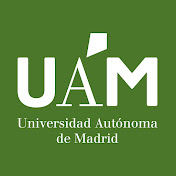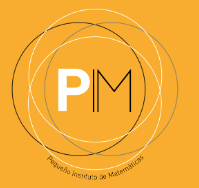Investigación
Noticias Destacadas
 Agenda del Departamento Agenda del Departamento |
- Información (provisional) sobre grupos y horarios de las asignaturas impartidas por el Departamento de Matemáticas, para el curso 2023-2024.
- Propuestas de Trabajos de Fin de Grado para el curso 2023-2024.
|
Canal @matematicasuamEnlace al canal del Departamento en youtube. |
PIM (Pequeño Instituto de Matemáticas)Con el objetivo de fomentar el interés por las matemáticas y dirigido a jóvenes entre 14 y 18 años, nace este proyecto de Instituto de Ciencias Matemáticas (ICMAT) en colaboración con nuestro Departamento, la Universidad Autónoma de Madrid y la Real Sociedad Matemática Española. El proyecto comienzó en el curso académico 2022-2023. Ampliar información en su página web. |
Seminario Teoría de Grupos ICMAT-UAM
Jueves 24/1/2019, 11:30, Aula 520, UAM
Ponente: Carlos Meniño (Universidade Federal Fluminense)
Title: Locally discrete virtually free groups of real-analytic circle diffeomorphisms. Construction and classification.
Abstract: The motivotion of this work is to understand all the possible locally discrete real-analytic actions on the circle up to topological conjugacy. These actions can be subdivided in the expansive ones, already studied by B. Deroin, and non-expansive ones which are being studied by our team in different works.
In the non-expansive case, for dynamical reasons, the group is conjectured to be virtually free. We show what kind of virtually free groups do act (locally discrete and real-analytically) on the circle and we shall describe all the possible actions up to topological conjugacy. This will depend in a generalized Ping Pong lemma which characterizes algebraically the considered group.
We shall show how the generalized Ping-Pong game is defined at the level of the Bass-Serre tree associated to a presentation of the virtually free group as a graph of groups (provided by Stallings' Theorem). This Ping Pong configuration descends to the circle in a suitable partition (defined in a dynamical sort) of the circle which will be called a "Maskit partition" in analogy with Kleinian groups.
This is joint work with J. Alonso, S. Álvarez, D. Malicet and M. Triestino.






